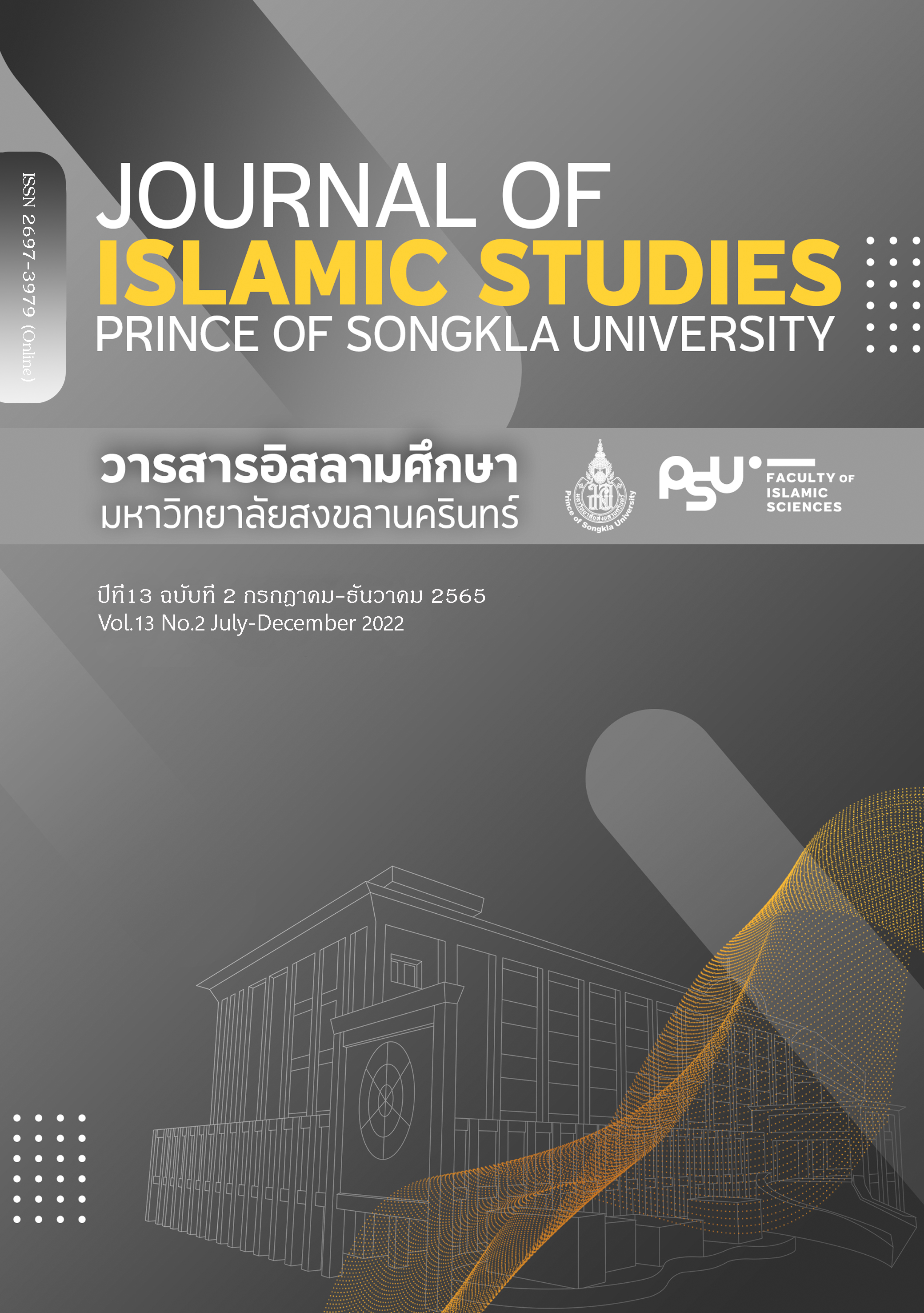Cultural Dynamics among Muslim Society in Southern Border Provinces of Thailand
Keywords:
Dynamic, Culture, Muslim society in Southern border provincesAbstract
Objectives: This research aims to study cultural dynamics among Muslim society in the southern border provinces emphasis on development and change factors as well as to study the current status and to serve as a guideline for collaboration between the government and the people in the southern border provinces.
Methodology: This research is qualitative research. The researcher has established a research approach that starts with collecting relevant documents and interviews using open-ended questions. The interviewees covered academics such as the provincial Islamic committees, Institute of Islamic studies, writers, network of civil society organizations, radio and TV presenters, experts, and people with direct experience. The information obtained will be important and used analyzed data by means of descriptive analysis and issue policy recommendations to government agencies concerned with cultural issues of Muslim society in the southern border provinces.
Research Findings: The Muslim society in the southern border provinces has a mix of cultures from the past to the present from many factors, for example, Patani in the past was a port city traded with international merchants. The entry into Islam is a part of cultural integration. Even with the adoption of Islam, the Hindu-Brahmin culture remains. Pre-Islamic past to the present and finally, globalization and local people studying abroad. It is part of the change in lifestyle Including various belief concepts from the affecting Muslims in the area, there are many different concepts and differences in each group of Islamic concepts, having difficulty in interacting with different outsiders.
Contribution: The government and private agencies can use the results of the study as a guideline for adaptation in working with the people's sector in the southern border provinces with different groups of Islamic concepts in the southern border areas and to know the positioning and enable to work properly with people with different in the southern border Provinces.
References
Bualuang, A. (2012). Má-laa-yoo · wát-tá-ná-tam râak ngâo · nai · mí-dtì wát-tá-ná-tam · bprà-wàt sàat láe pâap à-naa-kót · keun sòo săn-dtì jang-wàt chaai daen pâak dtâi [Cultural roots in the dimension of culture, history and future vision restore peace to the southern border provinces]. Ministry of Culture.
Chitniratna, N. (2015). Socio-Cultural Change Through Diversity of Life History and Experience of Congested Community Leaders. Journal of Parichart, Thaksin University, 26(1), 30-73. https://so05.tci-thaijo.org/index.php/parichartjournal/article/view/42942
Euamornvanich, P. (2017). Communication through Multi-Cultural Dimensions of Geert Hofstede. Academic Journal of Humanities and Social Sciences, Burapha University, 25(47), 223-229. https://so06.tci-thaijo.org/index.php/husojournal/article/view/76727
Jensantikul, N. (2020). THREE SOUTHERN BORDER PROVINCES INSTITUTIONALIZATION AND ACTION UNDER STRUCTURAL FUNCTIONALISM THEORY. Suthiparithat, 27(84), 77–90. https://so05.tci-thaijo.org/index.php/DPUSuthiparithatJournal/article/view/245033
Jittiyaphan, P. (2007). The Influence of Globalization Stream on Deviation Behavior of Thai Muslim Youth from Islamic Creed in Muang District Yala Province [Master’s thesis]. Faculty of Islamic Science, Prince of Songkla University. http://kb.psu.ac.th/psukb/handle/2010/6222
Kaewmoragot, P. (2017). Political Participation Culture of Youths in Multicultural Society: A Case Study of Thepha District Songkhla Province [Unpublished master’s thesis]. National Institute of Development Administration.
Katih, I. (2004). Asha'irah: History, Ideas and Influences upon Muslim's Faith in Southern Border Provinces of Thailand [Master’s thesis]. Faculty of Islamic Science, Prince of Songkla University. http://kb.psu.ac.th/psukb/handle/2010/6242
Makhmood, T. (2017). A Contrast between Islamic Culture and cultural Islam. ResearchGate. https://doi.org/10.13140/RG.2.2.16580.83843.
Narongraksakhet, I. & Hayimasae, N. (2010). Trít-sà-dee mài sà-tăa-ban gaan sèuk-săa mút-sà-lim jang-wàt chaai daen pâak dtâi [New Theory of Muslim Educational Institutions in Southern Border Provinces]. Research and Academic Selatan.
Ndee, H.S. (2010). Islam and Islamic Culture: Earliest Foreign Influences on Physical Activity in Pre-Colonial East Africa. The International Journal of the History of Sport, 27(5), 798–819. https://doi.org/10.1080/09523361003625857
Rattanamanee, P., Lohachinda, N., Hayeehama, N., Punyaburana, O., & Saengnil, J. (2007). Raai ngaan gaan wí-jai · wát-tá-ná-tam nai săam jang-wàt chaai daen pâak dtâi · bpàt-dtaa-nee · yá-laa láe ná-raa-tí-wâat [Cultural Research Report in the 3 Southern Border Provinces of Pattani, Yala and Narathiwat]. Princess Gulyani Vadhana Institute of Cultural Studies, Prince of Songkla University.
Raikhan, S., Moldakhmet, M., Ryskeldy, M., & Alua, M. (2014). The interaction of globalization and culture in the modern world. Procedia-Social and Behavioral Sciences, 122, 8–12.
Sirikase, B. (2020) A Study of Constructive Organizational Culture and Learning Organization in Mahamakut Buddhist University, Srilanchang Campus. Journal of the Association of Researchers, 22(2), 65-80. https://so04.tci-thaijo.org/index.php/jar/article/view/242914
Sinaga, A. I. (2016). Islamic Culture and Culture of Islam (As a Reflection in Rediscovering of Standard Absorption of Culture in Islamic Teaching). IOSR Journal of Humanities and Social Science (IOSR-JHSS), 21(5), 90-95.
Thepchai, K. (2012). Mí-dtì wát-tá-ná-tam · bprà-wàt sàat láe pâap à-naa-kót · keun sòo săn-dtì jang-wàt chaai daen pâak dtâi [Cultural Dimensions, History and Future Outlook return to peace in the southern border provinces]. Ministry of Culture.
Tuwaesidek, W. (2021). Patani History through the View of Long-term History: From 7 Huamuangs to the Anglo-Siamese Treaty of 1909 (1808-1909). Journal of Social Sciences, Naresuan University. 17(1). 187-214. https://doi.org/10.14456/jssnu.2021.7
Unno, A. (2011). Nabi Ta Ma-kae Pinae [Muhammad does not eat Betel Nits]: Malay Muslims in Thailand’s Southern Border Province. Ministry of Culture.
Downloads
Published
How to Cite
Issue
Section
License
Copyright (c) 2022 Journal of Islamic Studies, Prince of Songkla University

This work is licensed under a Creative Commons Attribution 4.0 International License.
All articles Published in The Journal of Islamic Studies are author’s opinions, and not the responsibility of the Faculty of Islamic Sciences nor the editorial board. However any citation should be referred to the journal.
















